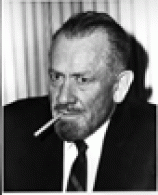John Steinbeck
Biography
John Steinbeck
John Steinbeck was born in Salinas, and lived the early part of his life in Monterey County, California. It was here that Steinbeck developed a knowledge and love of the natural world and the diverse cultures that figure so prominently in his works.
In 1930, Steinbeck met marine naturalist Edward F. Ricketts, and a close friendship developed. During the early to mid 1930s, Steinbeck lived with his wife Carol in the family cottage on 11th Street in Pacific Grove. He produced works including THE RED PONY, PASTURES OF HEAVEN, TORTILLA FLAT, IN DUBIOUS BATTLE, and OF MICE AND MEN. They moved to Los Gatos in the later half of the decade. THE GRAPES OF WRATH earned Steinbeck a Pulitzer Prize.
In the 1940s, Steinbeck spent most of his time living in New York and traveling abroad. By then he was an internationally acclaimed author.
While he hobnobbed with the N.Y. elite, he wrote nostalgically of life on the Monterey waterfront. Steinbeck’s old friend Ed Ricketts became the inspiration for "Doc" of CANNERY ROW and SWEET THURSDAY. Although Steinbeck wrote CANNERY ROW in N.Y., he returned briefly to Monterey in 1944 with his second wife, Gwen, and son Thom --- living in the Lara-Soto adobe on Pierce Street.
In 1948, after his second marriage ended and the death of his friend Ed Ricketts, he returned to the family cottage on 11th Street in Pacific Grove for several months.
In the 1960s, Steinbeck briefly passed through the area several times, once while working on TRAVELS WITH CHARLEY. In 1962, he was awarded the Nobel Prize for Literature.
On December 20, 1968, Steinbeck died in Sag Harbor, N.Y. His ashes were returned to California by his widow, Elaine and his younger son, John. The ashes rested for two nights in the P.G. cottage garden before being buried in the family plot in Salinas.
John Steinbeck











